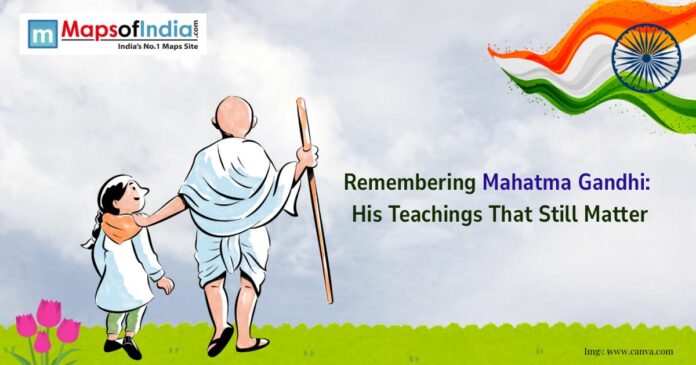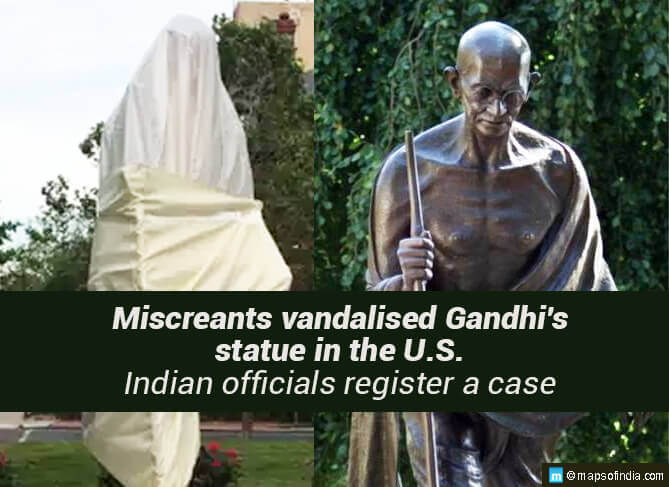When we honor Mahatma Gandhi on his birth anniversary, we need to stop honoring and take the lessons he left behind. Gandhi was the embodiment of courage, righteousness and humility in his life. His lessons are not useless, because they are directed towards the human nature of dignity and social progress.
In the rapidly moving modern world, one can be encouraged by pausing and reflecting on the philosophy of Gandhi and be motivated to act. Through the practice of truth, non-violence, simplicity, serving the human race and promotion of unity, we commemorate his legacy in significant ways. Gandhi Jayanti is not merely an anniversary day; it is a call to arms, a challenge to us to act upon the principles that can really change lives and countries.
The Power of Non-Violence
Ahimsa or non-violence was one of the most lasting principles of Gandhi. Non-violence was not a passive approach, as it was by Gandhi, but a force towards social change. He was convinced that the true power was not in imposing evil but resisting injustice with the help of peaceful actions. Gandhi proved that civil courage can relocate nations by the Salt March through his many civil disobedience campaigns.
Gandhi’s non-violent ideology is a guideline in the modern world where conflicts tend to burst out, either international or domestic, and turn into violence. When an argument is going on, in social activism or even personal relationships, it is better to choose dialogue over aggression, and resolutions could be given to issues that accord human dignity its rightful value.
Truth as a Guiding Principle
Truth is God, said Gandhi famously. Honesty and transparency were not only an ethical choice to him, but a requirement for a worthwhile life. This was his Satyagraha, meaning insisting on the truth, and this was the essence of his fight against colonial rule. Gandhi felt that there could not be justice achieved by lies and deception, but only by truth and integrity could society march ahead.
This teaching is more topical today than ever before. In politics, corporate culture, media, and individual behavior, the promotion of truth will promote trust and accountability. The fact that Gandhi insisted on truth puts us to the test to assess our actions and decisions, and whether they are just and right.
Simplicity in Life
Gandhi was a plain, self-restrained person wearing plain homespun and liking to live simply. His lifestyle was not only a personal choice, but also a political one, and emphasized self-reflexiveness and minimalism. He felt that material attachment is distracting from superior values such as compassion, service and moral responsibility.
In the contemporary world, where people have been struggling with issues of consumerism and environmental devastation, the message of the significance of simplicity that Gandhi taught us can be significant. Living consciously, mindful of what is going on and what is really important in life, can allow a person to have personal satisfaction and a sustainable future.
Service to Humanity
The life of Gandhi was Seva, or the activity of service to others. His life was devoted to the upliftment of the oppressed, agitation of the rights of the poor and education and sanitation in rural India. To him, a society can be assessed based on how it treats the weakest members of society.
This instruction acts as a catalyst for social activism and volunteering nowadays. Good deeds, volunteering, and attempts at solving inequality implement the vision of Gandhi of a caring and fair society. Service does not always need to be grand gestures; it is as simple as assisting a neighbor and being fair to people around us.
Unity and Religious Harmony
As much as India was a multi-religious country, Gandhi would always emphasize unity and peace among the different people who were varied in religious orientation, castes and lineages. He believed in the strength of society, and it was founded on respect and understanding for each other. It can be regarded as one of the biggest teachings of Gandhi, who attempted to reconcile and create unity in the modern, divided world.
Citizens can follow the example of Gandhi and become kind, meeting people and working with them to make the world a place where diversity is not the reason to be afraid of, but the reason to be loved. Social inclusion and cultural respect are universal concepts that may be applied to Gandhi as a guiding principle in a world that is typically fragmented with bigotry and religious intolerance.
Relevance in Modern Times
The teachings of Mahatma Gandhi are not a thing of the past, but they are practical lessons to our living today. His ideology promotes conscientiousness, ethical leadership, as well as social responsibility. In a world that has been more technological and highly globalized, and very complex, the teachings of Gandhi warn that development should be accompanied by morality.
The values of Gandhi can be used as a reference in any form of campaign, including environmental saving, the establishment of social justice or as a role model in business and leadership. The principles that are non-violence, truth, simplicity, service, and unity are not some abstract concepts but rather practical ones that could be used in the formulation of decisions, policies and daily conduct.
Conclusion
By remembering Mahatma Gandhi on the day he was born, we must cease honoring and remember what he taught. The incarnation of bravery, conscience and compassion was the life of Gandhi. His teachings are not useless now, because they touch on the most fundamental truth of human dignity and social development.
In the rapidly moving modern world, one can be encouraged by pausing and reflecting on the philosophy of Gandhi and be motivated to act. Through the practice of truth, non-violence, simplicity, serving the human race and promotion of unity, we commemorate his legacy in significant ways. Gandhi Jayanti is not merely an anniversary day–it is a call to arms, a challenge to us to act upon the principles that can really change lives and countries.





